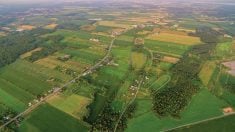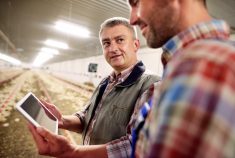Lance Stockbrugger always knew he wanted to farm. “It was going to be my career,” he says. “It was just a matter of how I was going to get there.”
When he was 11, Lance’s father was killed in a motor vehicle accident. The family — Lance, his mother and his three siblings — were forced to sell off the farm equipment and rent out their land near Humboldt, Sask. What had been a straightforward path to farm succession became a lot less clear.
Three months after his father died, a neighbour stopped by with an offer. He was looking for an employee to work on his mixed cattle and grain operation. Could Lance help out?
Read Also

Sibling squeeze part 6: The emotional stakes of a family legacy
The final instalment in a six-part series exploring the challenges of sibling conflict and the effect it can have on…
Lance already knew how to drive a tractor and had done everything he could for his dad. Before long he was riding to his neighbour’s farm before dawn to finish the morning chores before his boss had rolled out of bed. “I worked full-time all summer, and then during the school year I’d get off the bus and go straight over there.
“He was my first mentor,” says Stockbrugger. “And eventually he treated me like a partner, not an employee, and involved me in decisions.”
The mentorship concept is as old and as necessary as farming itself. There’s arguably an element of mentorship in every intergenerational farm. If the next generation is going to run the farm, they’ve got to learn how. For many farm families, a kind of mentorship attitude is baked into the very way the farm runs. It’s cultural.

But as farm businesses continue to get bigger, more complex and more demanding, are the best ways for younger farmers to learn from more senior farmers changing? And what happens when cultural mentorship is lacking on the family farm?
Vanessa Stockbrugger is a financial coach and the founder of Womencents, a Calgary-based consulting firm. She is also Lance’s sister.
She says even as a personal financial coach, she finds farm clients often reach out seeking business advice. “They’re saying, ‘Is there a better way to be selling my cattle or selling my grain?’ They seek guidance on financing equipment, transitions and purchasing land. There isn’t always a parent available to answer these questions.”
And sometimes, she says, a parent may not be the best person to ask. “If you are looking for a mentor, it’s important to have a trusted resource, and that they know that’s their role,” she says. “I think it can get blurry when it’s a parent.”
Vanessa is a mentor herself to women starting out in finance. At regular meetings, she says, she shares ideas on how to enter the industry and overcome challenges, and she offers guidance on career moves. She provides resources too, and contacts.
“It’s that idea of expanding their knowledge, contacts and relationships, and offering them what I’ve learned along the way,” she says. “And it’s an opportunity for the mentee to ask specific questions as things come up for them. There has to be trust, and a willingness to share — otherwise I think it breaks down quickly.”
In the business world, mentorship relationships carry a level of formality that’s important, says Vanessa. And the matching process is a linchpin.
“When you use the word mentor, I think it has to be strategic. Not everybody would be a good mentor for me just because they’re related to me or because they’re in finance,” Vanessa says. “It’s about building confidence and relevant experience to help you navigate your way.”
In the farming world, the horizons for mentorship are more open. A mentor could be a specific person — a parent, an uncle or a friend. It could even be Twitter, jokes Vanessa. For many farmers, a peer group that meets formally or informally can fill a mentorship role very effectively.
“I think it’s important to have a variety of knowledge, backgrounds and experience levels,” she says. “I expect young farmers would find that valuable: a forum to learn together and share ideas.”
Mentorship and ownership
Lance Stockbrugger was still working for his neighbour when he graduated high school. He told his mother he was intending to farm, but she said he had to go to university first.
Initially, he joined the military with the goal of training to be a fighter pilot; when that didn’t go as planned, he earned his business degree in finance, eventually becoming a chartered accountant.
All this time, he continued working for his neighbour. “In my third year of university, our family had some land become available and he asked if I wanted to farm it. At that time, I wasn’t partying all weekend and going out — I was coming back to the farm regularly,” says Lance. “I had started farming our own land using his equipment on trade for my labour.”
As he slowly built his own grain farm, Lance continued working as a CA, eventually specializing in income tax — an area where he realized there was a knowledge gap for many farmers. His consulting business and farm business grew together.
“I started really focusing and working with my clients, trying to understand what drove their businesses and to understand what management techniques they were using. My farm couldn’t afford to make large financial mistakes, so I watched and learned what others were doing,” he says.
In effect, he says, he had “hundreds of mentors” at different levels of the farming industry. Farms that were 500 acres. Farms that were 50,000 acres. Farms that were growing. Farms that were struggling.
“I learned as much from the less successful farms as the successful ones. I didn’t have a parent to teach me what not to do, but I could learn from other farmers’ techniques and mistakes,” he says.
Lance believes that if he’d skipped his education and gone straight into farming out of high school, his own farm might easily have failed. “In the ’90s, people were leaving the farm, not coming back to the farm. I wouldn’t be farming in the situation I am had I not taken my mom’s orders to go and get an education,” he says.
Lance quit his public accounting practice in 2012 to focus full-time on farming — and mentoring his own kids. But he wants his sons, now 15 and 16, to work for someone else, outside the farming industry, before they join the farm full-time.
“If they’re choosing to farm because it’s easy, they don’t have the passion to carry on the business. I want them to be here because they want to be here,” he says. It’s an idea he learned from his mom first, and then his farm clients. It allows farm kids to bring new ideas back to the farm. It also gives them confidence and a feeling of ownership in the farm business, the way his neighbour did for him.
He says something he always tells farmers with kids coming back to the farm is that those kids should be owners to some degree. They can be an employee, he says, but they also need to be a partners. One possibility is to start their own business in conjunction with the farm.
“It’s so they understand the risks and rewards of farming. They know that when a crop failure happens you lose money,” Lance says.
“If you just give them a wage, and they get to be there, some will be successful, but there is a higher chance of failure than there is for the ones that buy their way in,” he says. “When you employ people who you treat as partners, they get to the level where they’re making decisions for the farm in a way that matches the culture of the farm.”
The right mentor
Patti Durand works as an agricultural transition specialist for Farm Credit Canada. She says most of her clients come looking for advice when they’re creating an exit plan for the farm, but it’s always exciting when clients come in earlier in the process — when the younger generation is just starting out on the farm and both parties are looking for ideas on how to make the partnership work. At this stage, she says, “there’s all kinds of hope and flexibility.”
Durand has worked with farm families who seem to have a level of harmony that’s inspiring, but she’s also witnessed toxicity in farm settings “that made my stomach hurt.”

The corporate world, she says, fosters ingrained communication habits that are often missing on farms. “We have weekly meetings. We have an opportunity to voice concerns. We have brainstorming sessions. We have clearly documented compensation practices,” she says.
On farms, there’s rarely a binder with a list of standard operating procedures that can be consulted. And communication can be poor.
Durand’s team often does “gap analyses.” One of these gaps is the need for mentorship on the farm. Sometimes there’s a gap because the senior generation of farmers has a hard time articulating why they farm a certain way.
“Sometimes there’s a really good reason and sometimes that’s just how they always did it,” she says. “They have a good gut instinct, which they’ve developed over decades, but it’s hard to verbalize.”
It isn’t always a messy relationship, or bad communication, that makes off-farm mentorship a better choice. Sometimes, it’s a matter of proper “matching.”
Durand says a skills and knowledge assessment quiz can also help senior partners identify when they really aren’t the best fit as a mentor for their kids. “Maybe they can identify that, say, agronomy is not their best skill set, but there are other places those lessons can be learned,” she says. “It’s personality-based. You know yourself well, but if you can’t get out of your own way, call a spade a spade.”
If junior partners decide to seek mentorship off the farm, Durand says they should pursue it with caution and respect, asking the senior partner, “Here’s a person I’m considering as a mentor — how do you feel about that?”
“Ultimately you’re entering into a business partnership, and you have an obligation to give the senior partner a chance to say, ‘Yah, we’d prefer you go a little further from home,’” she says.
But mentorship also doesn’t have to be a super-formal, long-term engagement, Durand says. It can be a one-time thing, or it could have “a reason and a season” when the junior farmer needs to brush up on a particular area of farm management.
Wherever the junior partner goes for advice, the farm family still plays a pivotal role, and the generations have to learn to work together.
Durand says she coaches junior partners to be curious and ask lots of questions — “Why are you doing it that way? Why is this urgent?” — and senior partners to welcome those questions.
“The risk is that the question: ‘Why are you doing it that way?’ can feel judgy,” she says. “That shift of understanding and trusting that it’s being asked with good intentions — that’s part of good communication.”
One of the ways she helps senior farmers get their heads around the intergenerational partnership is to soften the tone.
“I say, ‘You know what, you’re going to have a mentorship role for a really long time — it’s not about kicking you off the farm. You’re really needed here. This is about a shift in your role. What an opportunity it is to watch your junior partner develop!’”
Navigating the bumps
There will inevitably be bumps on the road as younger farmers bring in new ideas about how the farm should run. But these are challenges strong farms are built to handle.
Patti Durand, farm transition specialist for FCC, says she regularly asks clients to put themselves in the other partner’s shoes. Why is Dad resisting this? Why is my son or daughter pushing this?
“Often, the senior farmer’s resistance to change comes from hard-learned lessons — expensive, emotional, personal lessons. Maybe they had a drought when interest rates were at 20 per cent in the ’80s and they have almost lost it all. Keeping on the straight and narrow and not changing feels very safe to them,” she says. Conversely, the junior partner really wants to “step up to the plate” and offer value to the farm. More communication can lead to a fruitful compromise.
Durand says a skills and knowledge assessment tool can also be helpful for the younger generation if they’ve worked or studied off-farm for a number of years before returning. It isn’t always easy for them. Durand says she had one client who completed the assessment and complained afterward that it made him “feel bad.”
“He said, ‘I can’t do any of these things!’ and I said, ‘You have to. We have a lot of dirt to move here.’ There can be a huge learning curve when you’re coming back to the farm. But you can make it your own.”
No matter their level of skills and knowledge, the transition process becomes immensely easier when the younger generation is given a level of autonomy, and when both parties are treated with respect.
“It’s about trusting good intent,” Durand says. “I’ve seen what’s possible, and that gives me great hope.”
















